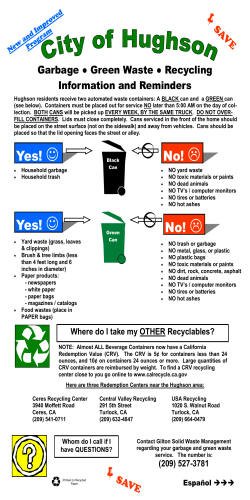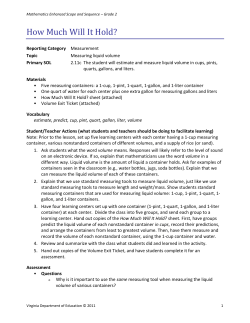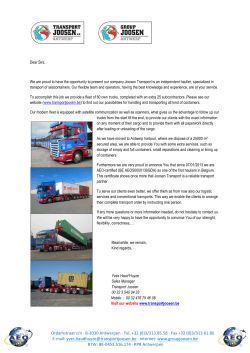
Container Management Fact Sheet
Container Management The plant science industry provides farmers with innovative crop protection products that enable them to improve agricultural productivity while sustainably managing precious natural resources such as land, soil and water. Product packaging plays an essential role in ensuring that crop protection products are delivered safely to the intended customers, while minimizing the risk of leakage and exposure. The containers in which products are sold are part of the plant science industry’s life-cycle approach to product stewardship. The industry is committed to ensuring that all containers are treated and disposed of safely and appropriately. Container Management Goals Container management programs represent the plant science industry’s commitment to safety and to ensure the industry is taking responsibility for its waste. Goals are: • safe delivery of crop protection products to the final customer • protecting both the environment and the operator from exposure • appropriate treatment and safe disposal of used packaging • reducing waste and maximizing recycling • ensuring compliance with local packaging requirements and legislation The plant science industry is actively working to promote the expansion of container management programs to new regions and countries, with the ultimate aim of recovering 100% of crop protection containers worldwide. The plant science industry has the ultimate aim to recover 100% of crop protection containers worldwide Program Areas The plant science industry is committed to managing crop protection containers from their development through to their end use and eventual disposal as part of the stewardship life-cycle approach. Container management programs and policies are therefore supported across three main areas: 1. Research and Design of Containers – Working to continually produce better, easier to handle and more environmentally sensitive packaging. This is a crucial phase of container management, as manufacturers can focus on preventing packaging waste at its source. Such innovations include: • small, ready-to-use packs (suitable size for backpack sprayers) • multi-trip, returnable containers • one-way, single-trip containers made of recyclable materials 2. Training of Distributors and Growers – Plant science industry companies also invest considerably in the training of distributors, retailers and growers. Approximately 300,000 individuals are trained annually to ensure products are used and disposed of safely and appropriately. They are trained to: • purchase appropriate-sized containers • never decant crop protection products into other containers • never use empty containers for other uses • properly clean and prepare empty containers for collection and recycling using the triple-rinse method 3. Support of Recycling Options – The plant science industry supports a range of different programs that enable the collection and recycling of properly rinsed containers in specific countries. These programs are supported or delivered by regional and national CropLife associations. Plastic recovered through these programs can be converted into a variety of useful products such as fenceposts, parking cones or drainage pipes. In areas where recycling is not yet an option, the industry promotes appropriate disposal of containers. Program Examples Container management programs are now established in over 40 countries around the world, with more than 20 pilot programs underway. The most successful programs are typically industry-led in partnership with various stakeholders such as local authorities and government. Here are some examples of container management programs around the world: Case Study 1 Case Study 2 United States Canada www.acrecycle.org www.cleanfarms.ca The Ag Container Recycling Council (ACRC) is a U.S. based non-profit organization that collects and recycles plastic crop protection containers. As a result of the ACRC, thousands of farmers and applicators in the U.S. participate in its free recycling program. So far, this program has collected 150 million pounds (68,000 metric tonnes) of containers, resulting in: CropLife Canada’s CleanFARMS program is a non-profit industry stewardship organization that manages crop protection waste products, plastic and packaging from farms across Canada. Since its inception in 1989, the program has: • savings of more than 570,000 cubic meters of landfill space • reduction of 29,250 metric tonnes of carbon equivalent • energy savings equal to over 124 million liters of gasoline • this is equivalent to removing 23,119 cars from the highway each year • collected and recycled more than 100 million empty pesticide containers, equivalent to saving over 517,000 barrels of oil • recycled containers into products such as drainage tile for use on the farm • safely collected and disposed of over 2 million kilograms of obsolete pesticides Originally developed by CropLife Canada, the brand has been made available to members of the global CropLife network that are implementing container management programs. The CleanFARMS brand is an effective tool to promote and align recycling efforts in a country or region; build awareness of programs among external stakeholders; and communicate the industry’s commitment to help farmers protect the environment. Case Study 3 Case Study 4 Brazil Germany www.inpev.org.br www.pamira.de Initiated in 2002, Brazil’s container management program coordinated by the National Institute for Processing Empty Containers (inpEV) has grown to become a benchmark for other sectors and countries. The program has removed more than 320,000 tonnes of empty containers from the environment (2002-2014), and recycled around 90% of all containers collected. An eco-efficiency study commissioned by inpEV demonstrates its social and environmental responsibility. In twelve years (between 2002 and 2013), the proper disposal of containers brought an environmental gain equivalent to: Germany’s PAMIRA program has been collecting and recycling empty pesticide containers since 1996. Founded by IVA, the German crop protection association, PAMIRA has succeeded in achieving strong collection rates in Germany, with 3.035 tonnes of empty containers collected in 2014. Farmers deposit used containers at one of the 339 collection points once per year. • 905,000 barrels of oil that did not need to be extracted, or • 394,000 tonnes of C02 equivalent that was not emitted into the atmosphere Did you know? Every ton of High Density Polyethylene (HDPE) plastic recycled into new products, as compared to using virgin HDPE plastic, results in energy savings equivelent to over 1,700 liters of gasoline. What are the Benefits? Container management programs deliver a variety of benefits to operators and the environment, including: • safe delivery of products to final customer • protecting the environment and operator from unnecessary exposure • safe disposal of used packaging • reducing waste and maximizing recycling • resource conservation impacts: energy savings (reducing need to burn gasoline or extract oil) saving landfill space reducing carbon emissions Contact CropLife International at croplife@croplife.org or visit www.croplife.org for more information. Helping Farmers Grow
© Copyright 2025










